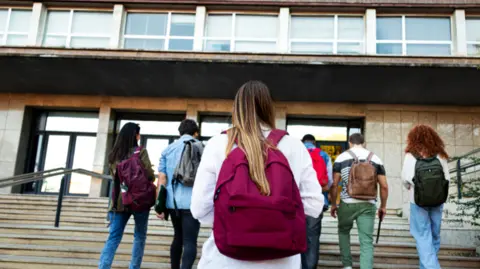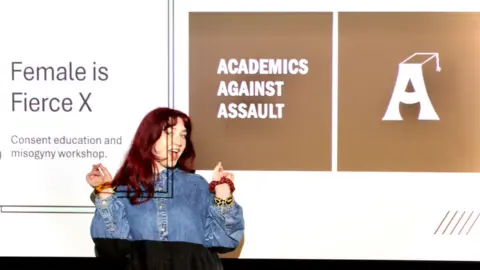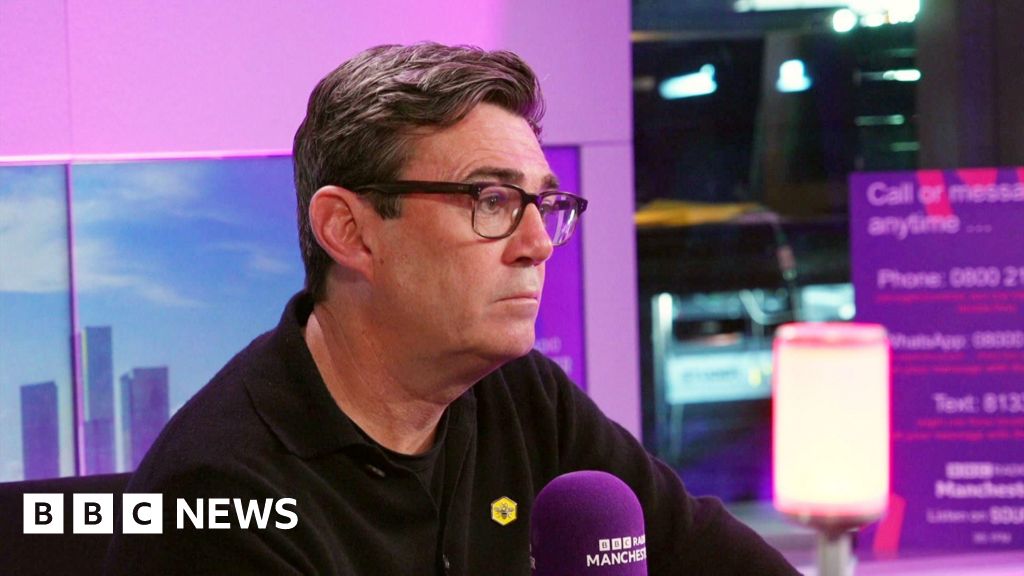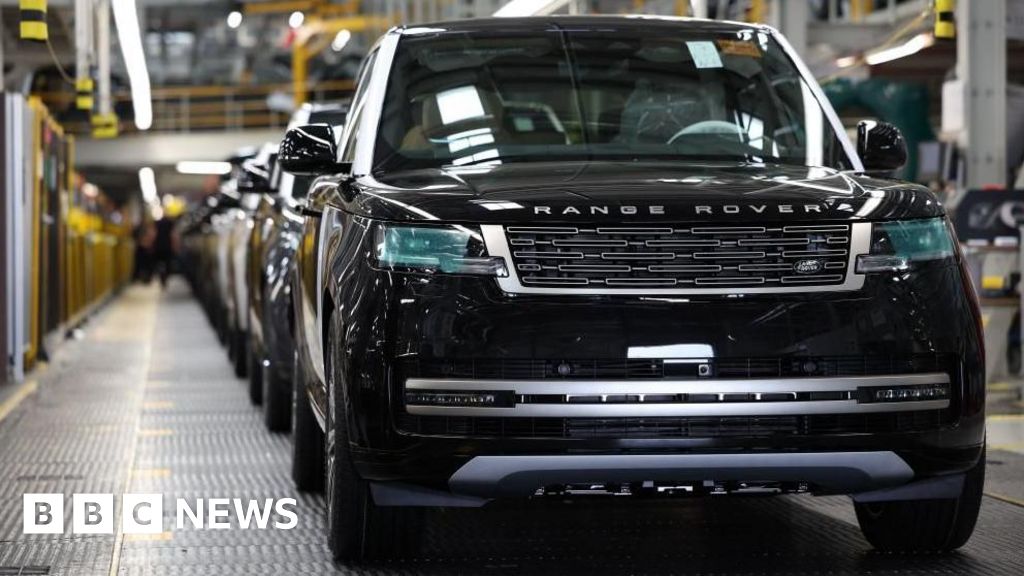Business
Thousands of students report sexual violence at university

Read full article on post.
Hayley ClarkeEducation reporter and
Emily Doughty
 Getty Images
Getty ImagesThousands of students have reported being victims of sexual violence and harassment in the first sector-wide survey of sexual misconduct at universities in England.
The Office for Students (OfS) said 14% of students responding to its survey reported being victims of sexual violence – which included rape, attempted rape and unwanted touching.
One in four students who responded reported experiencing sexual harassment.
And 1.5% of respondents reported having been in an intimate relationship with a staff member.
Women and lesbian, gay and bisexual students were more likely to have experienced both sexual violence and harassment than their male and straight peers, the survey suggests.
All final year undergraduate students in England were asked to fill out the survey, with 52,000 responding.
It is the first nationwide study of its kind, one which campaigners say they have been calling for since 2010.
The survey by the OfS, England’s higher education regulator, asked respondents for their experiences of:
- Sexual harassment (for example, unwanted sexually suggestive comments, exposure or unsolicited pictures)
- Sexual violence (for example, unwanted touching, attempted rape and rape)
- Intimate student and staff relationships
Students were also asked about whether they reported incidents to the university, and whether the support they received was good or poor.
Women were nearly three times more likely to experience sexual harassment than men, and more than twice as likely to experience sexual assault, the OfS said.
Nearly half – 47% – of lesbian, gay and bisexual students reported sexual harassment, compared to 22% of heterosexual students.
A spokesperson for Universities UK, which represents over 140 institutions, said universities were “determined to tackle sexual harassment”, adding that “this powerful data puts universities in a stronger position to prevent assault and harassment, support students and improve reporting”.
Dr Anna Bull, senior lecturer at the University of York and director of the 1752 Group, which researches and campaigns against sexual misconduct at universities, said the data “confirms what we have known for a long time”.
“For these students, university is not a safe or welcoming place,” she said.
“I hope that the higher education sector’s progress on this issue in the coming years will be as ambitious as this challenge requires.”
The LGBT Foundation says it offers an independent sexual violence advisor (ISVA) service covering greater Manchester to support those affected by sexual abuse.
‘I was told I would get over it’
Warning: Readers may find some details in this part of the story distressing
Molly Hanning, 22, a master’s student at Royal Holloway, University of London, says the support she received from the university was lacking after she was raped during the Christmas holidays of her first year.
She has waived her right to anonymity to share her experiences with the BBC.
Molly says she was given leaflets as support resources, and was passed on to other external services instead of being given direct help by the university’s support teams.
“They just didn’t to be involved and wanted to pass me to the next person – that was really, really frustrating,” she says.
She says she had to fight to get an appointment by making regular in-person visits to try and get herself seen. When she did get to speak to someone, she says she was made to feel like the issue was too big for the support services to deal with.
She says she was told to “download an app and do meditation”, and that “I would just get over it, and it would take time, but most people just get over it in the first couple of months”.
The lack of support “took a massive toll”, she says, leading to a breakdown in her mental health during her second year of university.
“I would have thought that wellbeing departments at universities would be able to cope with more than just exam stress,” Molly says.
Dr Nick Barratt, who runs the executive team supporting students at Royal Holloway, said they “understand the profound impact that experiences such as Molly’s can have” and are “committed to listening with care and responding with integrity”.
The university also strives to offer “compassionate support”, he said, adding that “we do not wait for harm to occur to create meaningful change for our students, and their voices are vital in shaping the support we provide on an ongoing basis”.
“While not all incidents disclosed to us take place on campus, our responsibility and desire to support our students remains the same,” he said.
 Lara Hama, Academics Against Assault
Lara Hama, Academics Against AssaultFollowing her experience, Molly set up Academics Against Assault, which is campaigning for education about consent to become mandatory at all UK universities.
She also runs training workshops about enthusiastic consent, and what bystanders can do if they witness incidents of sexual harassment or assault.
Dr Barratt said the university was grateful to Molly for her “extensive and impactful work”, which has included co-developing the new consent education teaching module at Royal Holloway.
The OfS survey follows the regulator’s publication of new guidance for universities on how to prevent and tackle harassment and sexual misconduct, which came into effect in August.
For the first time, universities are now required to:
- Provide training for staff and students “to improve understanding of what constitutes harassment and sexual misconduct”
- Publish information about their policies and procedures on how they deal with incidents of harassment and sexual misconduct
- Protect students from conflicts of interest and abuses of power that can arise from personal relationships between staff and students
A ban on non-disclosure agreements when dealing with cases of harassment or sexual misconduct also came into effect in September 2024.
Breaching these conditions could lead to universities being fined, the OfS said.
- A list of organisations in the UK offering support and information with some of the issues in this story is available at BBC Action Line
Business
It’s up to Labour MPs, says Burnham on leadership bid speculation

Read full article on post.
Greater Manchester Mayor Andy Burnham has said it’s up to Labour MPs to decide whether the party needs a change of leadership, as he faced questions about his political ambitions.
He told the BBC he had given “honest” answers to questions about Labour MPs privately urging him to challenge Prime Minister Sir Keir Starmer.
The mayor said Labour MPs “were in touch with me” to discuss the leadership, but insisted he was not interested in a “personality contest”.
Burnham, who won a third term as Manchester mayor last May, said the Labour government needed a “proper plan for the country”, including one to beat Reform UK, and offered “to support the prime minister” in developing fresh policies.
Burnham is not an MP and would need to become one, by winning a by-election, and resign as mayor before he could even begin the process of trying to challenge Sir Keir as Labour leader.
But no by-elections have been called at the moment and there’s uncertainty over whether he would be selected as a candidate if the opportunity did arise.
Burnham answered questions about the rampant speculation over his future during a phone-in on BBC Radio Manchester on Thursday.
The appearance came after Burnham was asked about the prospect of him returning to Westminster and mounting a leadership challenge in an interview with the Daily Telegraph.
When asked if MPs had urged him to run for the top job, Burnham said: “People have contacted me throughout the summer – yeah.”
On BBC Radio Manchester, Burnham was asked whether a bid for the leadership would be the biggest gamble of his political career.
In reply, he said: “Whenever Westminster has gone into a moment I’ve somehow been drawn into it.”
He added: “People have been getting in touch with me. And obviously I’ve said to them, it’s not a matter for me.
“This is ultimately a matter for the party in Westminster to decide. I’m here to support the party in whatever way I can.”
Earlier Steve Reed, the housing secretary, said Burnham was entitled “to make his case” but pointed out he had previously promised to serve a full term as mayor.
Reed suggested Burnham had been taking “potshots” at the prime minister and dismissed discussion of the Labour Party’s leadership as “tittle tattle”.
The housing secretary said Sir Keir had “picked this party up off the floor and led us through a record general election victory”.
“Our job now is to talk to the country, not ourselves about how we’re going to change the things they care about,” Reed said.
Burnham’s critics have also pointed out Burnham, a former culture and health secretary, tried and failed twice to become Labour leader when he was an MP.
In previous leadership campaigns, Burnham lost out to Ed Miliband in 2010 and Jeremy Corbyn in 2015.
Burnham came fourth in 2010, and second in 2015, losing out by a wide margin to Corbyn, who won with almost 60% of the vote.
Burnham’s latest interview comes ahead of Labour’s autumn conference, and after Sir Keir faced pressure from some MPs following the resignation of his deputy Angela Rayner and his sacking of Peter Mandelson as the UK’s ambassador to the US.
There has been disquiet among Labour MPs over the government’s performance and the rise of Reform UK in national opinion polls.
The mayor also told the Telegraph that Number 10 had created a “climate of fear” among some MPs.
Setting out policies he said would “turn the country around”, Burnham called for higher council tax on expensive homes in London and the South East; £40bn of borrowing to build council houses; income tax cuts for lower earners; and a 50p rate for the highest-paid.
His comments in the Telegraph come after his interview with the New Statesman, which was seen as a pitch for a Labour leadership bid.
In that interview, he criticised the prime minister’s approach, saying there needed to be “wholesale change” to see off an “existential” threat to Labour.
Outlining his vision for the country, Burnham described his politics as “aspirational socialism”.
His main policy ideas involved more public control of housing, energy, water and rail.
One of Burnham’s most prominent policies as mayor of Greater Manchester was taking buses back into public control.
Burnham told the New Statesman he was ready to work with anybody with a “plan to turn the country around” – including the Liberal Democrats and Corbyn, who is in the proces of setting up a new left-wing party.
Labour MP Callum Anderson accused Burnham of “wishful thinking” on economic policy, for saying in his New Statesman interview the government has to “get beyond this thing of being in hock to the bond markets”.
Anderson, who is a parliamentary private secretary to the cabinet minister Liz Kendall, wrote on X: “To lead a Labour government – and a Labour Treasury – you can’t just dismiss the bond markets.
“Every pound spent on schools, hospitals and infrastructure depends on credibility with those who lend to the UK. Real change requires fiscal discipline, not wishful thinking.”
Business
Government could buy car parts to protect Jaguar Land Rover suppliers

Read full article on post.
Ministers are considering stepping in to support Jaguar Land Rover’s suppliers after the carmaker was forced to suspend production due to a cyber-attack.
The attack at the end of August meant JLR was forced to shut down its IT networks. Its factories remain suspended until next month at the earliest.
Fears are growing that some suppliers, in particular the smaller firms who solely rely on JLR’s business, could go bust without support.
One idea being explored is the government buying the component parts the suppliers build, suppliers have told the BBC they are sceptical about the success of such a scheme.
The idea behind such a move would be to keep the companies in JLR’s supply chain in business until production lines are up and running again.
“To say we’re disappointed is an understatement,” said one supplier, who did not wish to be named.
They added the government “simply don’t understand the complexity of what they’re dealing with”, and “we don’t need promises, we need help”.
Chancellor Rachel Reeves was asked during a ministerial visit on Thursday if the government planned to support firms in JLR’s supply chain.
She said the focus was on getting the business running again, and the government was going to do “everything we can to stand by the company and the wider supply chain”.
JLR, which is owned by India’s Tata Motors, normally builds about 1,000 cars a day at its three factories in Solihull and Wolverhampton in West Midlands, and Halewood in Merseyside.
However, workers were sent home following the hack – which first came to light on 1 September – with no firm return date.
About 30,000 people are directly employed at the company’s plants with about 100,000 working for firms in the supply chain. Some of these firms supply parts exclusively to JLR, while others sell components to other carmakers as well.
There are also other companies that could be indirectly affected, such as cafes near to the manufacturing plants and transport companies that work with JLR.
JLR confirmed this week that its factories will not resume operations until at least 1 October, with earlier reports suggesting the disruption could last into November.
If the government was to step in, it is believed to be the first time that a company would have received help as a result of a cyber-attack.
Unions have called for a Covid-style furlough scheme, but ministers have ruled this out given its likely cost, sources have told the BBC.
While the purchase and stockpiling of car parts by the government is an option on the table, this would present considerable logistical challenges.
JLR’s manufacturing process relies on the right part arriving at the right place, at the right time.
Another option being considered are government-backed loans to suppliers, though this is understood to be unpopular with suppliers.
Speaking to BBC Radio 4’s Today programme, former Conservative mayor of the West Midlands, Andy Street, said the companies in JLR’s supply chain had been “very successful” and he supported offering them government-backed loans.
An investigation is under way into the attack, which is believed to be costing the company at least £50m a week in lost production.
It has been reported by industry publication The Insurer that JLR had not been able to finalise an agreement for insurance against a cyber-attack ahead of the incident. The BBC has contacted JLR for a response.
In recent years, dozens of high-profile hacks have prompted governments to take measures to help companies affected, with experts at places like the National Cyber Security Centre sent to help recovery efforts.
But the idea of supporting companies financially is something that has not been considered, as the burden is normally shouldered by the insurance industry or the companies themselves.
In the US, authorities have carried out “hack backs” against cyber-crime groups, which has led to the clawing back of millions of dollars that criminals have taken in ransoms that are then given back to victims.
JLR also has large factories in Slovakia and China, as well as a smaller facility in India, which have also been affected by the shutdown.
The Business and Trade Select Committee is due to meet on Thursday afternoon to hear testimonies from businesses in JLR’s supply chain.
This evidence will be shared with the government afterwards.
Senior government figures are concerned about a pattern of cyber-attacks on UK institutions and businesses, such as the British Library, Marks & Spencer, and the Co-op.
A group calling itself Scattered Lapsus$ Hunters has claimed responsibility for the hack on JLR, Marks & Spencer, and Co-op.
On Thursday, Co-op reported that the cyber-attack it suffered earlier this year cost it at least £206m in lost revenues.
JLR has been receiving support from the National Cyber Security Centre and the National Crime Agency.
The Department for Business and Trade said ministers had discussed “the impacts of the cyber-incident and how JLR can work towards restarting production”.
In its most recent statement, JLR said: “Our focus remains on supporting our customers, suppliers, colleagues, and our retailers, who remain open.”
Additional reporting by Pritti Mistry and Michael Sheils McNamee
Business
Government could buy car parts to protect Jaguar Land Rover suppliers

Read more on post.
Ministers are considering stepping in to support Jaguar Land Rover’s suppliers after the carmaker was forced to suspend production due to a cyber-attack.
The attack at the end of August meant JLR was forced to shut down its IT networks. Its factories remain suspended until next month at the earliest.
Fears are growing that some suppliers, in particular the smaller firms who solely rely on JLR’s business, could go bust without support.
One idea being explored is the government buying the component parts the suppliers build, suppliers have told the BBC they are sceptical about the success of such a scheme.
The idea behind such a move would be to keep the companies in JLR’s supply chain in business until production lines are up and running again.
“To say we’re disappointed is an understatement,” said one supplier, who did not wish to be named.
They added the government “simply don’t understand the complexity of what they’re dealing with”, and “we don’t need promises, we need help”.
Chancellor Rachel Reeves was asked during a ministerial visit on Thursday if the government planned to support firms in JLR’s supply chain.
She said the focus was on getting the business running again, and the government was going to do “everything we can to stand by the company and the wider supply chain”.
JLR, which is owned by India’s Tata Motors, normally builds about 1,000 cars a day at its three factories in Solihull and Wolverhampton in West Midlands, and Halewood in Merseyside.
However, workers were sent home following the hack – which first came to light on 1 September – with no firm return date.
About 30,000 people are directly employed at the company’s plants with about 100,000 working for firms in the supply chain. Some of these firms supply parts exclusively to JLR, while others sell components to other carmakers as well.
There are also other companies that could be indirectly affected, such as cafes near to the manufacturing plants and transport companies that work with JLR.
JLR confirmed this week that its factories will not resume operations until at least 1 October, with earlier reports suggesting the disruption could last into November.
If the government was to step in, it is believed to be the first time that a company would have received help as a result of a cyber-attack.
Unions have called for a Covid-style furlough scheme, but ministers have ruled this out given its likely cost, sources have told the BBC.
While the purchase and stockpiling of car parts by the government is an option on the table, this would present considerable logistical challenges.
JLR’s manufacturing process relies on the right part arriving at the right place, at the right time.
Another option being considered are government-backed loans to suppliers, though this is understood to be unpopular with suppliers.
Speaking to BBC Radio 4’s Today programme, former Conservative mayor of the West Midlands, Andy Street, said the companies in JLR’s supply chain had been “very successful” and he supported offering them government-backed loans.
An investigation is under way into the attack, which is believed to be costing the company at least £50m a week in lost production.
It has been reported by industry publication The Insurer that JLR had not been able to finalise an agreement for insurance against a cyber-attack ahead of the incident. The BBC has contacted JLR for a response.
In recent years, dozens of high-profile hacks have prompted governments to take measures to help companies affected, with experts at places like the National Cyber Security Centre sent to help recovery efforts.
But the idea of supporting companies financially is something that has not been considered, as the burden is normally shouldered by the insurance industry or the companies themselves.
In the US, authorities have carried out “hack backs” against cyber-crime groups, which has led to the clawing back of millions of dollars that criminals have taken in ransoms that are then given back to victims.
JLR also has large factories in Slovakia and China, as well as a smaller facility in India, which have also been affected by the shutdown.
The Business and Trade Select Committee is due to meet on Thursday afternoon to hear testimonies from businesses in JLR’s supply chain.
This evidence will be shared with the government afterwards.
Senior government figures are concerned about a pattern of cyber-attacks on UK institutions and businesses, such as the British Library, Marks & Spencer, and the Co-op.
A group calling itself Scattered Lapsus$ Hunters has claimed responsibility for the hack on JLR, Marks & Spencer, and Co-op.
On Thursday, Co-op reported that the cyber-attack it suffered earlier this year cost it at least £206m in lost revenues.
JLR has been receiving support from the National Cyber Security Centre and the National Crime Agency.
The Department for Business and Trade said ministers had discussed “the impacts of the cyber-incident and how JLR can work towards restarting production”.
In its most recent statement, JLR said: “Our focus remains on supporting our customers, suppliers, colleagues, and our retailers, who remain open.”
Additional reporting by Pritti Mistry and Michael Sheils McNamee
-
Culture2 days ago
Taylor Swift’s new cinema outing generates more than €12million in just 24 hours
-
Environment1 week ago
Chimps drinking a lager a day in ripe fruit, study finds
-
Politics2 days ago
European Parliament snubs Orbán with vote to shield Italian MEP from Hungarian arrest
-
Culture2 weeks ago
Life, loss, fame & family – the IFI Documentary Festival in focus
-
Health3 days ago
EU renews support for WHO’s Universal Health Coverage Partnership
-
Culture2 days ago
Twilight at 20: the many afterlives of Stephenie Meyer’s vampires
-
Environment5 days ago
Key oceans treaty crosses threshold to come into force
-
Culture2 months ago
Fatal, flashy and indecent – the movies of Adrian Lyne revisited








































